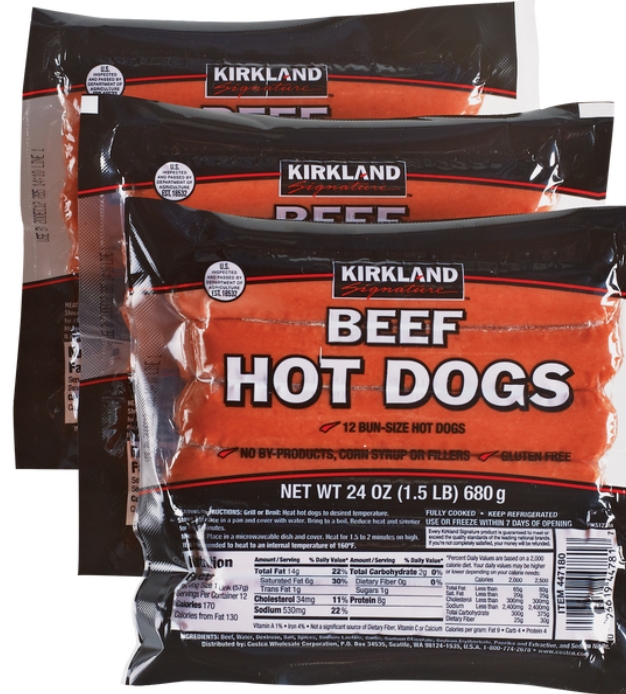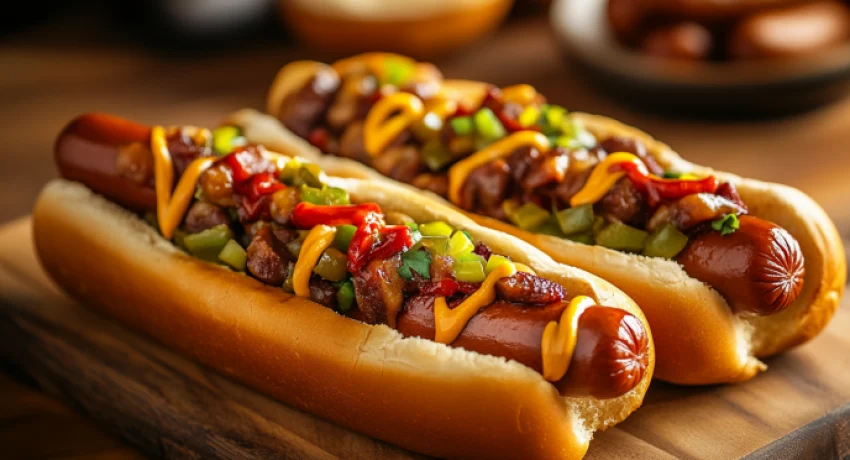
Kirkland Signature Beef Hot Dogs, 12 Links, 1.5 lbs, 3 ct
- Great on the grill
- Ready in minutes
From Backyard BBQs to Budget-Friendly Meals: Why Costco’s Hot Dogs Have a Cult Following
In the vast landscape of American comfort food, few items inspire as much passionate devotion as a perfectly prepared hot dog. And when it comes to the intersection of quality and value, Kirkland Signature Beef Hot Dogs have become legendary among Costco members nationwide. These humble cylinders of savory beef have transcended their simple status to become a phenomenon worthy of exploration. Whether you’re a longtime fan or considering your first purchase, this comprehensive guide will answer everything you’ve ever wanted to know about these beloved beef frankfurters.
A Love Letter to the Warehouse Wiener
I still remember my first Kirkland hot dog experience. It was a sweltering July afternoon, and my neighbor had invited our family over for an impromptu cookout. As the sizzle of meat hit the grill, he proudly announced he’d just picked up “the good dogs” from Costco. I was skeptical at first—store brand hot dogs? But that first bite instantly converted me. The snap of the casing, the rich beef flavor, the perfect balance of seasonings… I was hooked.
That moment began a decade-long love affair with what I now consider the best value in hot dogs. But what exactly makes these particular hot dogs so special? Let’s dive deep into the world of Kirkland Beef Hot Dogs and uncover their secrets.
What’s Actually in Your Kirkland Beef Hot Dog?
The foundation of any great hot dog is its ingredients, and Kirkland doesn’t disappoint here. Unlike many budget brands that leave you squinting at a paragraph of unpronounceable additives, Kirkland Signature Beef Hot Dogs are made with 100% beef with no by-products or fillers padding the meat.
The ingredient list is refreshingly straightforward: beef, water, salt, and a blend of spices including paprika, garlic, and other natural flavors. They do contain some preservatives like sodium nitrite (we’ll discuss this more later), but compared to many competitors, the list is relatively clean.
What you won’t find are mechanically separated meats, chicken or turkey fillers, corn syrup, or artificial flavors. This commitment to quality ingredients is one reason these hot dogs have developed such a loyal following.
For those with dietary concerns, it’s worth noting that the hot dogs do contain dextrose (a simple sugar) and extractives of paprika, which contribute to both flavor and that appealing reddish color we associate with hot dogs.
The 100% Beef Claim: Marketing or Reality?
When a package proudly proclaims “100% beef,” consumers have rightfully become skeptical. Is this just clever marketing, or are Kirkland hot dogs truly made exclusively from beef?
The good news is that the claim holds up to scrutiny. Kirkland Signature Beef Hot Dogs are indeed made with 100% beef and not a mixture of different meat types. This is a significant step up from many budget hot dogs that might include poultry or fillers to reduce costs.
However, it’s important to understand what “100% beef” means in practical terms. While the meat component is entirely beef, the finished product includes other ingredients like water, salt, spices, and preservatives—which is standard for virtually all processed meat products. What the claim actually indicates is that no other meats or meat by-products are included.
The beef used is generally chuck and round cuts, which provide a good balance of lean meat and fat for flavor. These are choice cuts rather than scraps or by-products, which contributes significantly to the premium taste profile that fans appreciate.
Where to Find Your Kirkland Hot Dog Fix
The search for these sought-after sausages has a simple answer: Kirkland Signature products are exclusive to Costco warehouse clubs. You won’t find them at your local grocery store, supermarket, or even online retailers like Amazon (at least not officially).
This exclusivity is part of Costco’s business model—creating high-quality store brands that drive membership value. To purchase these hot dogs, you’ll need a Costco membership, which currently runs about $60 annually for a basic membership or $120 for the Executive level.
Occasionally, you might spot them on third-party resale sites, but beware of markup pricing and potential issues with refrigeration during transit. For the authentic experience and best value, heading to your nearest Costco is the way to go.
Inside the warehouse, you’ll typically find them in the refrigerated section alongside other packaged meats. During summer grilling season, they often occupy prominent end-cap displays or promotional areas as Costco knows their popularity spikes during barbecue weather.
The Price Point: Value That’s Hard to Beat
One of the most compelling aspects of Kirkland Beef Hot Dogs is their exceptional value proposition. At approximately $14-16 for a package containing three pounds of hot dogs (about 36 individual franks), they’re significantly more affordable than premium competitors while maintaining comparable quality.
This breaks down to roughly 39-44 cents per hot dog—a remarkable price point considering the quality. For comparison, premium brands like Nathan’s or Hebrew National typically cost 60-85 cents per hot dog when not on sale.
This value extends beyond just the initial purchase price. The generous packaging means one purchase can cover multiple family meals or a sizeable backyard gathering, eliminating the need for multiple packages of smaller, more expensive brands.
It’s worth noting that prices may vary slightly by location and season, with occasional sales bringing the cost down even further. During summer promotional periods, Costco sometimes offers multi-pack deals that can reduce the per-unit cost to astonishing levels.
The Nitrate Question: Preservation vs. Health Concerns
For many health-conscious consumers, nitrates and nitrites in processed meats have become a concern. So where do Kirkland Beef Hot Dogs stand on this issue?
The straightforward answer is that Kirkland Beef Hot Dogs are not nitrate-free. They contain sodium nitrite, a common preservative used in cured meats that helps prevent bacterial growth (particularly botulism), preserves color, and contributes to flavor.
While some brands offer “uncured” or “no nitrate added” alternatives, it’s important to understand that these products typically use natural sources of nitrates, such as celery powder or juice, which convert to nitrites in the product. The chemical effect is essentially the same, though marketing may suggest otherwise.
For those concerned about nitrates, it’s worth considering that the occasional consumption of hot dogs as part of a balanced diet is unlikely to cause issues for most people. However, if you’re specifically avoiding nitrates for health reasons, you might want to explore specialized alternatives (though not under the Kirkland brand).
Gluten Concerns: Can Everyone Enjoy Kirkland Hot Dogs?
Gluten sensitivity affects a significant portion of the population, making this an important consideration for many families. The good news is that Kirkland Signature Beef Hot Dogs are generally considered gluten-free, containing no wheat, barley, or rye ingredients.
However, they are not explicitly certified gluten-free, and Costco does not make official claims about their gluten-free status. For those with severe celiac disease or extreme gluten sensitivity, there’s always the possibility of cross-contamination during processing.
Most consumers with mild to moderate gluten sensitivity report no issues with Kirkland hot dogs. The straightforward ingredient list makes it easier to assess potential allergens compared to more complex processed foods.
If you have severe gluten intolerance, it may be worth contacting Costco directly for the most current information about manufacturing processes and potential cross-contamination risks before consumption.
The Taste Test: How Do They Compare to Premium Brands?
The ultimate test of any food product is taste, and this is where opinions become more subjective. How do Kirkland Beef Hot Dogs stack up against established premium brands like Nathan’s or Hebrew National?
In blind taste tests (including several I’ve conducted at family gatherings), Kirkland hot dogs consistently perform impressively against higher-priced competitors. Most tasters note their robust beef flavor, balanced seasoning, and satisfying texture that delivers the coveted “snap” when bitten into.
Compared to Nathan’s, Kirkland hot dogs tend to have a slightly milder flavor profile with less garlic intensity. Against Hebrew National, they lack the distinctive kosher seasoning blend but offer a more straightforward beef flavor that many prefer.
What Kirkland hot dogs excel at is consistency. While some premium brands can vary between batches, Costco’s rigorous quality control ensures a remarkably consistent product experience. This reliability is particularly valuable for restaurants, food service operations, and frequent entertainers.
The texture deserves special mention—Kirkland hot dogs achieve an ideal balance between tenderness and firmness. They don’t disintegrate when grilled (a common problem with cheaper brands) nor do they remain too firm after cooking.
Nutritional Breakdown: What’s the Health Profile?
Let’s be honest—hot dogs aren’t typically considered health food. However, understanding their nutritional profile can help you make informed decisions about how they fit into your overall diet.
Each Kirkland Beef Hot Dog (about 57g) contains approximately:
- 170 calories
- 15g of fat (6g saturated)
- 40mg of cholesterol
- 570mg of sodium
- 2g of carbohydrates
- 0g of fiber
- 1g of sugar
- 7g of protein
These values position Kirkland hot dogs in line with other all-beef options, though they tend to be slightly higher in fat and sodium than turkey or chicken alternatives (which, of course, come with different taste expectations).
For those watching sodium intake, the 570mg per hot dog represents about 24% of the recommended daily limit. This is typical for cured meat products, and something to be aware of when planning meals.
The protein content is moderate at 7g per dog—not a protein powerhouse, but still contributing meaningful protein to your meal, especially when multiple hot dogs are consumed.
Preparation Details: Ready to Eat or Not?
A common question about any hot dog is whether it requires cooking or is ready to eat straight from the package. Kirkland Beef Hot Dogs, like most commercial hot dogs, are fully cooked during manufacturing.
This means they’re technically safe to eat without additional cooking. However, most people prefer to heat them for improved flavor and texture. Cold hot dogs directly from the package have a different mouthfeel and don’t release their flavors as effectively as when warmed.
The cooking step also helps to reduce the risk of any potential bacterial contamination that might have occurred after the manufacturing process, making it a recommended safety step particularly for children, elderly individuals, or those with compromised immune systems.
Storage Smarts: Freezer-Friendly Franks
One practical advantage of Kirkland’s large pack size is the ability to portion and freeze what you don’t need immediately. Kirkland Beef Hot Dogs freeze exceptionally well, maintaining their quality for up to 2 months in a properly maintained freezer.
For best results, consider these freezing tips:
- Freeze in the original packaging if unopened
- If opened, wrap tightly in plastic wrap and place in a freezer bag
- Consider dividing into meal-sized portions before freezing
- Label with the freeze date
- Thaw in the refrigerator overnight rather than at room temperature
When properly frozen and thawed, most people cannot detect any difference in taste or texture compared to fresh hot dogs. This makes the bulk packaging much more practical for smaller households.
Refrigerator Shelf Life: How Long Will They Last?
For refrigerated storage, unopened packages of Kirkland Beef Hot Dogs will typically last until the “use by” date printed on the package—usually about 2-3 weeks from purchase.
Once opened, the hot dogs should be consumed within 7 days for optimal quality and safety. The vacuum-sealed packaging helps preserve freshness before opening, but once that seal is broken, the clock starts ticking.
If you notice any of these signs, it’s time to discard the hot dogs regardless of date:
- Slimy texture developing on the surface
- Unusual or sour odor
- Discoloration beyond the normal cured red color
- Mold spots of any kind
When in doubt about freshness, remember the food safety mantra: “When in doubt, throw it out.” The cost of replacement is far less than the potential consequences of foodborne illness.
Keto Considerations: Can They Fit a Low-Carb Lifestyle?
With the rise of ketogenic and low-carb diets, many consumers are reevaluating traditional foods. Surprisingly, Kirkland Beef Hot Dogs are actually quite keto-friendly despite being a processed food.
With just 2g of carbohydrates per hot dog, they can easily fit within most low-carb dietary frameworks. The high fat content (15g per dog), which might be a concern in other dietary approaches, is actually an advantage for keto dieters seeking higher fat intake.
The main adaptation for keto consumers would be serving method—skip the traditional bun in favor of lettuce wraps, serve with low-carb sides, or incorporate into keto-friendly casseroles.
It’s worth noting that while the carb count is low, the processed nature of hot dogs means they shouldn’t form the foundation of any diet—keto or otherwise. They’re best enjoyed as an occasional protein option within a more varied eating pattern.
Quantity Questions: How Many Come in a Pack?
The standard package of Kirkland Beef Hot Dogs contains approximately 36 individual hot dogs across three individually vacuum-sealed packs, totaling three pounds.
This packaging approach offers several advantages:
- You can open one-third of the package at a time, keeping the remainder sealed
- The overall quantity offers excellent value for large families or gatherings
- The division into three packs makes freezing portions more convenient
During certain promotional periods, Costco sometimes offers special packs with even more hot dogs, though the standard configuration remains the three-pound package divided into three separate sealed sections.
Ingredient Integrity: The Artificial Flavor Question
In an era of increasing concern about artificial additives, many consumers specifically look for products without artificial flavors and colors. Kirkland Beef Hot Dogs partially meet this criteria—they contain no artificial flavors, relying instead on natural spices and seasonings for their distinctive taste.
However, they do contain natural extractives of paprika for color enhancement and sodium nitrite as a preservative. While these aren’t technically “artificial flavors,” they are processing aids that some clean-eating advocates prefer to avoid.
The absence of artificial flavors is a significant step up from many budget hot dog brands, which often rely heavily on synthetic flavor compounds to create a meat-like taste while using lower-quality ingredients.
Cooking Mastery: Getting the Perfect Kirkland Hot Dog
While hot dogs seem straightforward to prepare, achieving the perfect balance of exterior char and juicy interior takes some finesse. Here are the best methods for preparing Kirkland Beef Hot Dogs:
Grilling (The Gold Standard)
Grilling is undoubtedly the premier cooking method for Kirkland hot dogs, imparting smoky flavor and creating that coveted light char on the exterior.
For perfect grilled hot dogs:
- Preheat your grill to medium heat (350-375°F)
- Place hot dogs perpendicular to the grates to prevent them from falling through
- Cook for 5-7 minutes, rotating every 1-2 minutes for even char
- Look for light grill marks and slight plumping as indicators of readiness
Avoid high heat, which can cause the casings to split prematurely and release flavorful juices.
Stovetop Methods
Don’t have access to a grill? These stovetop methods also yield excellent results:
Pan-Frying:
- Heat a skillet over medium heat
- Add a light coating of oil or butter
- Cook hot dogs for 8-10 minutes, rotating regularly
- For extra flavor, add a splash of water and cover briefly to steam
Boiling:
While not providing the char of other methods, boiling yields a plump, juicy hot dog.
- Bring a pot of water to a gentle simmer (not a rolling boil)
- Add hot dogs and cook for 4-5 minutes
- Remove promptly to prevent flavor loss to the water
Air Fryer Excellence:
The air fryer has become a popular alternative for hot dog preparation:
- Preheat air fryer to 390°F
- Place hot dogs in the basket with space between them
- Cook for 4-6 minutes until heated through with a slightly crisp exterior
- No need to flip if your air fryer circulates heat well
Regardless of method, avoid puncturing the casing before or during cooking, as this allows the flavorful juices to escape and can result in a drier hot dog.
Grilling Greatness: Why Kirkland Hot Dogs Excel on the Barbecue
While Kirkland hot dogs perform well with any cooking method, they truly shine when grilled. Several factors contribute to their grilling excellence:
- Optimal fat content – The balanced fat percentage helps them remain juicy while developing exterior char
- Quality casing – The casing provides the perfect amount of resistance, creating the satisfying “snap” when bitten
- Robust beef flavor – The hearty beef profile stands up well to smoky grill notes
- Structural integrity – They maintain their shape without shriveling or splitting excessively
For enhanced grilling results, try these pro tips:
- Create shallow diagonal slits on the surface (not cutting all the way through) to increase surface area for caramelization
- Brush lightly with butter before grilling for extra richness
- Let them rest for 1-2 minutes after grilling before serving
Many grilling enthusiasts specifically choose Kirkland hot dogs for large gatherings because they’re forgiving on the grill even with varying heat zones or when cooking attention is divided.
What Do Customers Actually Think? The Review Consensus
Customer reviews for Kirkland Beef Hot Dogs are overwhelmingly positive across multiple platforms. On Costco’s website, they consistently maintain ratings above 4.7 out of 5 stars, with thousands of reviews.
Common praise points include:
- Exceptional value compared to premium brands
- Consistent quality across purchases
- Superior taste to many higher-priced competitors
- Excellent grilling performance
- Versatility for different recipes
The few negative reviews typically center around:
- Packaging damage (a shipping issue rather than product quality)
- Personal preference for different seasoning profiles
- Concerns about processed meat in general
Food bloggers and consumer testing organizations frequently rate Kirkland hot dogs among the top choices in blind taste tests, often ranking them alongside or above brands costing significantly more.
Food Court vs. Packaged: Are They the Same Product?
Costco’s food court hot dogs have their own cult following, prompting many to wonder if they’re the same as the packaged Kirkland Signature Beef Hot Dogs sold in the store.
The answer is no—they are similar but distinct products. The food court hot dogs are quarter-pound all-beef hot dogs made specifically for food service, while the packaged Kirkland hot dogs are slightly smaller at around 1/6 pound each.
The food court version is designed to work specifically with Costco’s cooking equipment and service needs, while the packaged version is optimized for home preparation. Both share the commitment to quality and value, but they are formulated slightly differently.
Many fans claim to detect taste differences, with some preferring the food court version and others favoring the retail package. The food court hot dog also comes with the benefit of Costco’s famous $1.50 hot dog and soda combo—a price that has remained unchanged since the 1980s.
Religious Dietary Considerations: Halal and Kosher Status
For those following religious dietary guidelines, it’s important to note that standard Kirkland Signature Beef Hot Dogs are neither halal nor kosher certified.
The hot dogs are not processed according to Islamic halal requirements, which would necessitate specific slaughter methods and ingredient restrictions. Similarly, they lack kosher certification, which would require rabbinical supervision throughout production.
Consumers seeking halal or kosher options would need to look to specialized brands. Hebrew National offers kosher hot dogs (though not under the Kirkland brand), while several smaller manufacturers produce halal-certified alternatives.
Filler Facts: The Truth About What’s Inside
One of the most common concerns with budget hot dogs is the use of fillers and by-products to extend the meat and reduce costs. Kirkland Beef Hot Dogs stand apart from many competitors by containing no fillers or meat by-products.
Unlike cheaper hot dogs that might include:
- Mechanically separated meat
- Soy protein concentrate
- Corn syrup solids
- Modified food starch
- Cereal fillers
Kirkland’s hot dogs contain beef, water, salt, spices, and minimal preservatives. This cleaner ingredient profile contributes significantly to their premium taste and texture.
This commitment to quality ingredients without fillers is particularly impressive given their price point, which is often lower than brands that do use fillers and by-products.
Beyond the Basic Dog: Creative Culinary Applications
While there’s nothing wrong with the classic hot dog in a bun with mustard, Kirkland Beef Hot Dogs are versatile enough to star in numerous creative culinary applications:
Breakfast Innovations:
- Slice and add to breakfast scrambles with peppers and onions
- Wrap in pancakes for homemade “corn dogs” with a breakfast twist
- Dice and add to hash brown casseroles
Main Dish Transformations:
- Korean-inspired hot dogs with gochujang sauce and kimchi
- Hot dog fried rice with vegetables and egg
- Loaded hot dog mac and cheese casserole
- Hot dog stir-fry with cabbage and Asian seasonings
Party-Perfect Appetizers:
- Pigs in blankets using puff pastry
- Hot dog pinwheels with cheese
- Cornbread-battered hot dog bites
- Hot dog-stuffed jalapeño poppers
The clean beef flavor profile makes these hot dogs adaptable to a wide range of cuisine styles and flavor combinations beyond traditional American preparations.
Conclusion: The Verdict on Kirkland’s Beef Hot Dogs
After thoroughly examining every aspect of Kirkland Signature Beef Hot Dogs, the verdict is clear: they represent an exceptional value in the hot dog market, delivering premium quality at a budget-friendly price point.
Their combination of 100% beef content, minimal fillers, balanced seasoning, and excellent cooking performance makes them a standout option for everything from casual family dinners to large gatherings. While they contain some preservatives like most processed meats, their relatively straightforward ingredient list sets them apart from many competitors.
For Costco members, these hot dogs exemplify the retailer’s philosophy of providing high-quality products at warehouse prices. Their consistent performance and taste have earned them a devoted following that spans from everyday consumers to food enthusiasts.
Whether you’re a hot dog connoisseur or simply looking for a reliable option for your next cookout, Kirkland Beef Hot Dogs deserve a spot in your refrigerator—just be prepared to defend your choice when hot dog brand debates inevitably arise at your next barbecue. After all, few food products inspire as much passionate loyalty as these humble but mighty all-beef franks.




